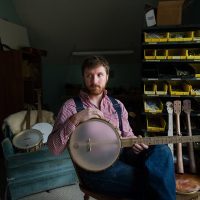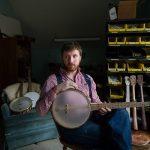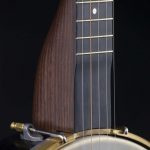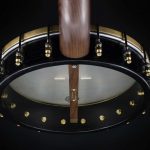
Patrick Heavner
Banjo builder and player Patrick Heavner created Pisgah Banjos in 2012 to make affordable, professional quality handcrafted instruments using 100 percent native Appalachian hardwoods.
Patrick grew up in Morganton, North Carolina, and attended Appalachian State University in Boone, where he first became enamored with old-time music. Patrick took a course in Appalachian Studies and started learning to play some fiddle. His freshman roommate had a banjo, and Patrick soon got one of his own for his birthday. He started learning tunes and attending the Todd General Store and Jones House Community and Cultural Center old-time jam sessions.
When Patrick returned to school as a sophomore, he wanted a nicer instrument and went to visit Watauga County builder Charlie Glenn to see his instruments. “I checked out his banjos, and instead of purchasing one I asked Charlie if he would show me how to build one. He sat me down right there and showed me how he makes banjo rims,” Patrick recalls. “I built my first one over Thanksgiving break in my father’s basement and took it to Charlie several times for help.” Patrick has been building banjos ever since.
In 2012, Patrick started the Pisgah Banjo Company in Fairview, North Carolina, before opening his shop in Asheville, where the banjos are currently made. Patrick has a great interest in and deep respect for Appalachian culture, and he has sought out luthiers and crafts people around the region for inspiration. In addition to Charlie Glenn, Patrick also notes Blue Ridge artists Lo Gordon, his father, and Appalachian State University shop teacher Phil Armstrong as building mentors. Other influences include a host of American open-back banjo builders, such as Bart Reiter, Kevin Enoch, and Greg Galbreth.
Patrick also strives to source his materials, parts, and even energy as local as possible. “I wanted to use what was locally available to me, much like folks in the Appalachian region would do,” he says. “And I was able to keep my price lower because I wasn’t spending a lot of money on ebony and rosewood. Instead we have used persimmon, applewood, black locust, and a new sustainable black material called richlite.” Patrick also developed his own hardware that is made in the United States, and he supplies parts to many other builders. The Pisgah Banjo Company shop utilizes solar power from the roof to run the machinery, helping Patrick further meet his mission.
Patrick has conducted banjo building workshops at Warren Wilson College and John C. Campbell Folk School, where he has also taught beginning clawhammer banjo playing.





